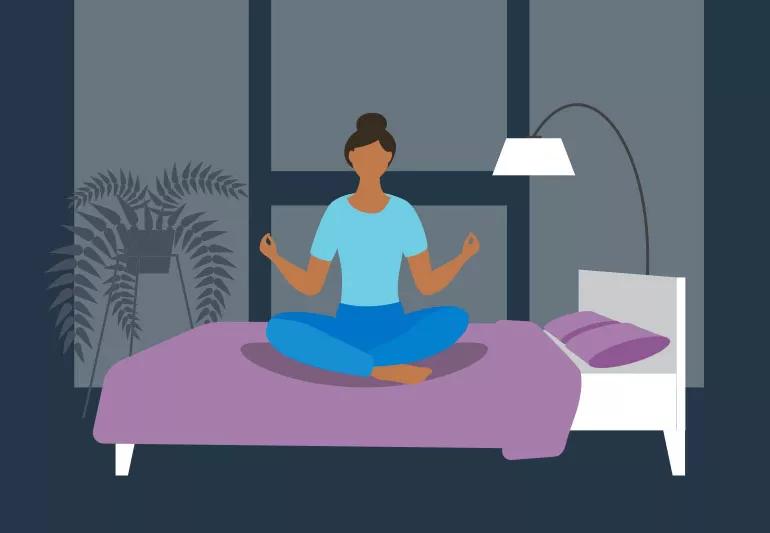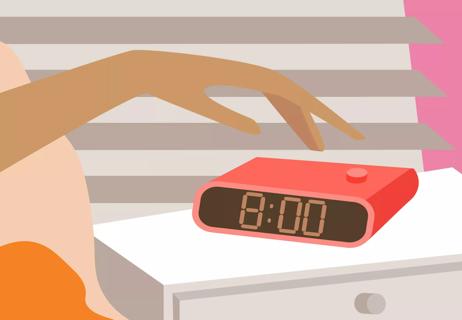Tame racing thoughts with breathing exercises, screen time limits and connecting to your body

All is quiet. The lights are out, and your phone’s on sleep mode. You’d like to be in sleep mode, too, but your brain is relentlessly running through the list of things you have to get done tomorrow.
Advertisement
Cleveland Clinic is a non-profit academic medical center. Advertising on our site helps support our mission. We do not endorse non-Cleveland Clinic products or services. Policy
This happens to many people because, when we lie down in bed, environmental distractions are generally low, and we’re left alone with our thoughts.
It would be so simple if we just had an off switch for our brain. But there are reasons why it sometimes just keeps going, and going and going … often at the wrong times. How do you cut off the endless reel of images and thoughts running through your head before bed?
Behavioral sleep medicine specialist Michelle Drerup, PsyD, DBSM, explains why our minds tend to race at night and how to find relief so you can get your sleep back on track.
While enjoying some daydreaming before bed can be a calming and normal thing to do, racing thoughts are on a whole other level.
“We have the good fortune of existing in bodies with a strong mind-body connection. But for most people who find themselves awake while lying in bed, their thoughts are not particularly positive in nature,” explains Dr. Drerup. “So, when our thoughts are stressful, our bodies respond in a similar fashion, and our fight-or-flight system is activated.”
Over time, this tendency to ruminate in bed gets reinforced, like a vicious loop. Then, our brains become conditioned to begin worrying when we lie down at night.
Advertisement
“The bed itself becomes associated with worry and anxiety,” says Dr. Drerup.
A particularly stressful week ahead may lead you to have a bit more cluster in your brain before bed. But if you find this is happening to you multiple nights in a row even when you don’t feel particularly stressed about anything, it may be a concern you want to address.
Racing thoughts can look different for everyone, but can include things like:
Fortunately, there are ways to put the brakes on worrisome thoughts at night. Here are some tactics you can utilize to help put your mind to rest.
Mindfulness can help you throughout the day, but it can also set you up for a better night’s sleep. Calming your brain isn’t an easy feat, but the practice of meditation has been shown to help settle you down before bed.
This can be achieved through slow breathing exercises or other relaxation techniques. Engaging in mindfulness-based techniques can also be beneficial because it trains you to view your thoughts from a curious standpoint, rather than buying into those negative thoughts.
“This can reduce fight-or-flight arousal,” says Dr. Drerup.
But keep in mind: Meditation practices may take numerous practice sessions to get down, so don’t feel discouraged if you don’t feel the benefits from it right away.
Instead, take baby steps. Carve out five minutes before bed to do a guided meditation (either through an app, online video or just by listening to music). Then, once you feel you can do five minutes, bump it up to 10 or 15 minutes.
A journal can be beneficial as an intentional dumping ground for both the good feelings and the bad ones. That means if you feel yourself being taken over by negative thoughts before bed, you can try putting them on paper as a mindfulness practice.
“Some may find it helpful to keep a worry journal, where you dedicate 15 minutes early in the evening to logging your worrisome thoughts,” suggests Dr. Drerup. This can be the place where you momentarily give your worries or racing questions some space.
Advertisement
“Learning to challenge your thoughts or answering your own ‘what ifs’ can serve to reduce anxious thinking,” she adds. This serves as a tangible way to contain worry so you aren’t bringing your concerns to bed with you.
On the flip side, you can also have a separate, more positive journal that focuses on gratitude. “Engaging in gratitude right before bedtime results in a calmer body and more positive pre-sleep thoughts,” notes Dr. Drerup.
You may not even notice that your body is tense until you actively try to relax it. And racing, anxious thoughts can cause several different physical symptoms like muscle tension and even chest tightness.
Progressive muscle relaxation has been shown to be a good way to help relax the effects of stress on your body. Similar to a body scan, progressive muscle relaxation involves closing your eyes and focusing on specific parts of your body by tensing and relaxing different areas — from your toes all the way up to your shoulders.
And as it’s a practice you can do anywhere at any time, it serves as a perfect bedtime routine to help you check in with your body and put your mind’s chaos to rest.
You can also try doing some light stretching or even yoga before bed to release tension and help you connect more to your body.
Advertisement
Unsurprisingly, looking at a bright screen that has access to all of the world’s information all at once before bedtime can absolutely trigger or worsen your racing thoughts.
But as many of us know, it’s easier said than done to put down the phone before bed. Start out by trying to establish a bedtime buffer zone. While there isn’t really a magic number, a half-hour to an hour window before bed without screens can help you wind down. During that time, try and avoid any type of screen time in order to calm your mind.
As Dr. Drerup also points out, screen time tends to be overly stimulating to the brain, and the light that screens emit delays the release of melatonin, a hormone that regulates sleep-wake cycles.
Cutting out your phone can also help send a signal to your brain that is indeed time for bed. “Having a 30-to-60-minute period dedicated to winding down serves as a cue to the brain that you will soon be going to bed and makes falling asleep easier,” says Dr. Drerup.
In some cases, repeated anxiety and worry before bed can also be a sign of an anxiety disorder or insomnia. Especially if you find yourself losing hours of sleep every night, or feeling fatigued or exhausted during the day, it may be a sign that your racing thoughts are starting to affect your day-to-day functioning.
Advertisement
If you don’t find relief from racing thoughts after lifestyle changes or relaxation techniques, seeing a behavioral sleep medicine psychologist may be the next step if anxiety is mainly only disruptive to your sleep. If you find that your mind is racing and you’re experiencing anxiety throughout the daytime, too, the next best step may be to see a psychologist or mental health provider who specializes in anxiety disorders.
In some cases, a healthcare provider may also suggest certain medications in combination with therapy to help manage your anxiety before bed. Some common medications they may recommend include:
Humans experience roughly 50,000 thoughts per day. So, it’s normal to have occasional worrying thoughts and experience situational anxiety. But for some people, it may start to feel hard to control. If you’re experiencing racing thoughts before bed, it may be a sign of a specific stressor impacting your life. But if it’s persistent, it’s helpful to reach out to a healthcare provider to learn more about your options to put intrusive thoughts to bed.

Sign up for our Health Essentials emails for expert guidance on nutrition, fitness, sleep, skin care and more.
Learn more about our editorial process.
Advertisement

Pain, light exposure and anxiety are just a few factors that could be waking you up in the middle of the night

Stress, alcohol, sleep apnea and (you guessed it!) scary movies are a few common causes of bad dreams

It’s normal to oversleep occasionally, but sometimes, there might be an underlying cause

How this common sleep problem causes confusion and strange behavior upon waking

Signs, causes and ways to address this problem

Tips for readjusting your sleep cycle

To avoid sleep deprivation and shift work sleep disorder, try adopting habits that minimize light exposure and prioritize daytime sleep

Sleep disorders, mental health conditions and other health concerns can all affect the quality of your sleep

Even small moments of time outdoors can help reduce stress, boost mood and restore a sense of calm

A correct prescription helps your eyes see clearly — but as natural changes occur, you may need stronger or different eyeglasses

Both are medical emergencies, but they are very distinct events with different causes